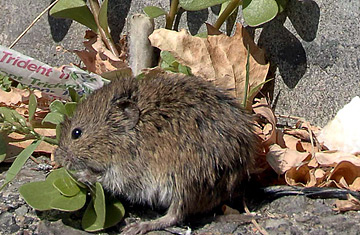
A file photograph showing one of the voles during a demonstration where thousands of people demanded a solution for the mole plague that's affecting the rural regions in Castilla y Leon, Western Spain, 02 August 2007.
It looked to be a good year in Carpio. Throughout central Spain, a mild winter had protected sprouting plants from frostbite while cool summer temperatures had kept roots from scorching under the Castillian sun, and this farming town, located two hours northwest of Madrid, expected an abundant crop. But then came the voles. By harvest time in late August, Margarita Alonso's hope had turned to despair. "Look at this!" she exclaimed disgustedly as she discarded gnawed potatoes from atop the family combine. "They've eaten half the crop!"
To the list of injustices Spanish farmers face — falling subsidies, erratic weather, irksome E.U. regulations — add the humble mountain vole. Few worried when the furry rodents first appeared on the plains of Castilla-León last fall. But by summer, a curious nuisance had become a devastating plague. These days, an estimated 750 million voles are marauding their way through central Spain's alfalfa, beets, potatoes and even vineyards. According to figures released by the regional government at the start of August, they have ravaged some 260,000 hectares (more than 1,000 sq. mi.) and caused at least 30 million euros worth of damage. And no one knows exactly how to stop them.
Traditionally, Castilla-León is Spain's breadbasket, its dry flatlands covered with wheat, barley and other grains that require little water. But in recent decades, farmers have begun switching to more profitable irrigated crops, unwittingly creating an alluring new habitat for the vole. "Since the late 1980s we have seen occasional cycles in which large numbers of voles, drawn by these new food sources, have appeared in the northern part of Castilla-León," says biologist Juan José Luque, a rodent specialist at the University of Valladolid. "What's extraordinary this year is that, instead of declining over the winter, the population exploded."
The voles first survived because of the season's mild temperatures, then flourished thanks to large litters and a fleeting, 21-day gestation cycle. But in rural Spain, suggests Luque, people "prefer more elaborate theories." Says Ariano Medina, a beet farmer in the village of Fresno el Viejo, echoing a rumor common in these parts, "These aren't the moles we've had all our lives. I heard that scientists working for the government created them to feed endangered birds of prey."
The regional government has promised to eradicate the plague in five weeks by burning fields, distributing poison, and clearing nests. But earlier this week a German biologist hired to assist with the endeavor told El País newspaper that he had doubts about the plan. In Fresno el Viejo, where selected fields were burned in early August, the impact was minimal, says Medina: "The voles just went to other fields." Silvia Clemente, Councilwoman for the region of Castilla-León, announced on Wednesday that there had been a 58% reduction in voles in towns where active treatment with poison and burnings began three weeks ago.
Growers across the region are angry about what they consider an inadequate government response, and agricultural unions are threatening collective action. In the meantime, some farmers are taking matters into their own hands. One potato field just outside of Fresno is dotted with poison-filled red plastic tubes. Medina, who fears the environmental and health risks of the chemicals, instead puts out buckets of water each night. "Voles are stupid animals," he says. "Plus they're not very good swimmers. They fall in and can't get out."
Alonso, who calls the lack of government action a "disgrace," shares the despair of many farmers in Carpio. As she and her husband, along with four hired workers, toss aside the ruined potatoes they've just unearthed, she frets about the future. "The voles have taken our winter bread," she says. "What are we going to eat?"
